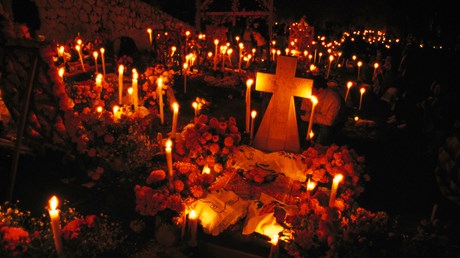The Mexican holiday is more prominent than ever. Three evangelicals who’ve seen Día de los Muertos up close weigh in.

El Día de los Muertos, translated as the Day of the Dead, is a Mexican holiday also celebrated in many US communities. It has roots both in the Catholic observances of All Saints’ and All Souls’ Days and in indigenous Mexican beliefs about the dead.
According to the ancient religion of Mexico, Day of the Dead traditions help the spirits of the dead return to their families, keeping them happy and forestalling the difficulties the dead could inflict on the living. Celebrations vary by region, but they have much in common: altars with offerings to dead relatives, skull-shaped sugar candies, marigolds, incense, votives, and food; candlelit cemeteries; tissue-paper cutouts; and calaverita (“little skull”) decorations everywhere.
CT asked Christians who’ve been in ministry in places where the Day of the Dead is celebrated, “Can Christians participate in good conscience? If so, how?”
Sally Isáis (Mexico City, Mexico): Christians shouldn’t participate at all, given the nature of the holiday.
Every mid-October before the Day of the Dead, my parents would receive a note from my Mexico City school saying, “If your daughter does not bring her part for the classroom offering, she will flunk civics class.”
My mother would say, “I am sorry, but as evangelical Christians, we cannot be part of this celebration, even if it means Sally will not pass the course.” She would then ask the teacher if there was any way that I could make up for not participating. Some years I flunked the course, and other years I was allowed to present another project. My peers were always upset that I would not do my part to decorate the class altar to the dead. My children had similar ...
from Christianity Today Magazine
via


.gif)

.gif)
.gif)
